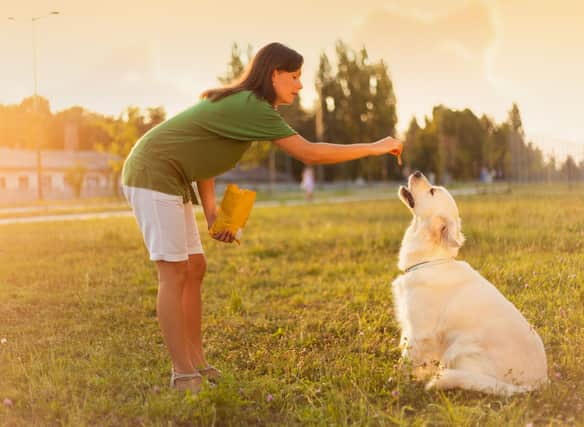Here are 5 expert tips on rewarding your adorable dog with treats during training - to create a perfectly behaved pet
This article contains affiliate links. We may earn a small commission on items purchased through this article, but that does not affect our editorial judgement.


A pocket of tasty treats is a great way to let your pooch know what behaviour is expected of them, with regular rewards making them more likely to sit, stay and walk to heel the next time of asking.
And with so many of us welcoming new four-legged friends into our homes over the last two years, there are plenty of new dog owners looking to make sure theirs is the most perfectly behaved in the park.
Advertisement
Hide AdAdvertisement
Hide AdIn-house vet Ciara Clarke and animal training instructor Jodie Guildharry, from in-house experts Butternut Box, have teamed up to offer their top tips on using treats to train your dog.
Here’s what they had to say:
Reward the behaviour you want and ignore the behaviour you don’t
Research has shown that dogs respond much better to reward over correction.
Every time you reward your dog, you’re telling them they’ve done something you like so, by consistently rewarding what you want, you’re reinforcing this behaviour and increasing the chances of it being repeated.
Conversely, by ignoring behaviours you don’t want or asking your dog for an alternative behaviour, you are reducing the chances of the behaviour being repeated.
Timing is key
Since you need to teach your dog what you’re asking from them, rewards are used as signals to tell them they’ve done a good job.
It’s really important that the reward is delivered as soon as the behaviour has been displayed so that your dog knows what they are being praised for.
order to buy yourself a bit more time, you can look into clicker training your dog – this is where your dog learns to associate the sound of the clicker with the knowledge that a reward is coming.
Cater rewards to your dog
Dogs, much like humans, are individuals with different tastes and preferences; something one dog loves, the next dog might not be so keen on. Rewards are no different, as each dog will respond in different ways to different rewards.
Advertisement
Hide AdAdvertisement
Hide AdDog treats are often the most popular choice for rewards however, if your dog doesn’t respond as well to treats, playing a game or showing affection can also serve as a reward for good behaviour.
By trying out different rewards, you will soon find what your dog responds best to.
Start small and build
Always start training your dog somewhere with no distractions such as at home. As they start to master each behaviour, you can up the ante by slowly increasing the distraction level.
Once your dog can consistently repeat a requested behaviour in all rooms of your house and in the garden, you can progress onto the park starting at quiet times.
Once your dog is nailing it every time, you’re ready to try it out with other dogs around. Never be afraid to go back a step if your dog isn’t understanding what’s being asked.
Adapt overtime
When starting out, it’s best to reward your dog for any small step towards the finished behaviour. For example, when teaching your dog to come back to you, you may start by rewarding your dog for just orienting their head in your direction. However, as your dog gets more proficient, you’ll be waiting to reward at the end of the complete behaviour.
When you’re teaching in this way, you can get through a lot of food rewards, so remember to calculate them into your dog’s daily calorie intake.
Read more
Advertisement
Hide AdAdvertisement
Hide AdA message from the Editor:
Thank you for reading this article. We're more reliant on your support than ever as the shift in consumer habits brought about by Coronavirus impacts our advertisers.
If you haven't already, please consider supporting our trusted, fact-checked journalism by taking out a digital subscription.
Comments
Want to join the conversation? Please or to comment on this article.